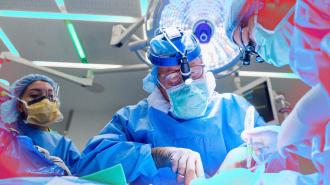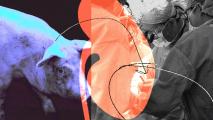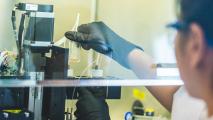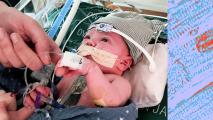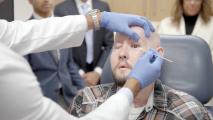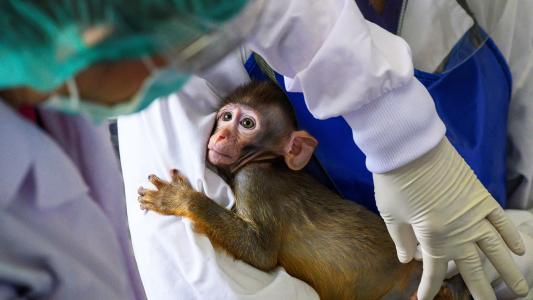A New Jersey woman with both heart failure and kidney failure is now the second person in the world to undergo a gene-edited pig kidney transplant — but the organ she received was very different from the one used in the first patient.
A deadly catch-22: Lisa Pisano was in a terrible situation prior to undergoing this groundbreaking procedure at NYU Langone Health.
Her heart was too weak to effectively pump blood throughout her body, but she didn’t qualify for a heart transplant because she was on dialysis. To get off dialysis, she needed a kidney transplant, but she didn’t qualify for one of those because her heart was too weak.
“All I want is the opportunity to have a better life.”
Lisa Pisano
With her situation deteriorating, her doctors suggested a gene-edited pig kidney transplant — an experimental treatment only tried once before. After discussing it with her husband, she decided to take a chance on the procedure, which was approved through the FDA’s compassionate use pathway.
“All I want is the opportunity to have a better life,” said Pisano. “After I was ruled out for a human transplant, I learned I didn’t have a lot of time left.”
The procedures: Pisano was likely to die within days or weeks if her heart failure wasn’t addressed, so the NYU Langone team started there, implanting a “left ventricular assist device” (LVAD) on April 4 to help her heart pump blood.
Eight days later, Pisano underwent a second procedure during which surgeons transplanted a kidney from a gene-edited pig into her body. They also transplanted the pig’s thymus gland, as they suspected that will help her immune system accept the pig organ.
“She is recovering extremely well,” said team leader Robert Montgomery during a press conference on April 24. “Her kidney function, 12 days out from the transplant, is perfect, and she has no signs of rejection.”
The difference: This wasn’t the first pig kidney transplant. That honor goes to surgeons at Massachusetts General Hospital, who transplanted a pig kidney into 62-year-old Richard ‘Rick’ Slayman on March 16. (As of April 3, he was at home and doing well.)
However, this is the first time surgeons have implanted a mechanical heart pump into a person expected to later get a kidney transplant (human or otherwise).
The pig kidney used for this procedure also came from an animal that underwent just one genetic modification — knocking out the gene that controls the production of a certain sugar (alpha-gal) — while the pig used for the previous procedure had undergone 69 edits.
“If we want to start saving more lives quickly, using fewer modifications and medications will be the answer.”
Robert Montgomery
The purpose of all those edits was to increase the likelihood of the human body accepting the pig kidney, but based on previous research, the NYU Langone team thinks just the one edit — and the transplantation of the thymus — should suffice.
If they’re right, the minimal gene editing could potentially make pig kidneys easier to source for future transplant recipients.
“Since these pigs can be bred and do not require cloning like more-complex gene edits, this is a sustainable, scalable solution to the organ shortage,” said Montgomery. “If we want to start saving more lives quickly, using fewer modifications and medications will be the answer.”
Looking ahead: Montgomery told reporters that the team is hopeful the thymus transplant will allow them to eventually reduce the amount of immunosuppressant drugs Pisano has to take, as those leave transplant recipients at higher risk of infection.
They’re also “eagerly awaiting” FDA approval to conduct clinical trials of pig organ transplants. For now, though, their focus is getting Pisano healthy enough to go home.
“The measure for success is a chance at a better quality of life and to give Lisa more time to spend with her family,” said Nader Moazami, one of the surgeons who performed the LVAD procedure prior to the pig kidney transplant.
We’d love to hear from you! If you have a comment about this article or if you have a tip for a future Freethink story, please email us at [email protected].
